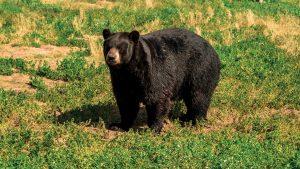The Florida black bear (Ursus americanus floridanus) is a unique sub-species that once numbered over 11,000 prior to European settlement. It is the only bear in our state. With an historic range across Florida, the bear once resided in all of the mainland and even on islands near the coast. Native Americans, such as the Timucuans and Apalachees, hunted black bears for food and clothing, and the black bear symbolized strength and courage to many indigenous cultures. By the mid-1970s, with the rampant growth of the human population and corresponding development and habitat loss, the bear population dwindled, and only about 20% of its original range was inhabited. Today, due to conservation measures and public awareness, bears now occupy about 50% of their original range and have an estimated statewide population of 4,000. There are five core areas of bear habitat in Florida, and one is the Eastern Panhandle, including Leon, Gadsden, Wakulla, Franklin and Jefferson Counties. As these counties still retain forested habitat and the bears now have a level of protection, our local numbers are likely stable or growing.
The vast majority of a bear’s diet comes from plants (e.g., berries, nuts, and fruits), but bears will eat insects, such as termites and ants. Only about 5% of their diet comes from meat, including armadillos and opossums. Adult males weigh 250-450 pounds, and females weigh 125-250 pounds. Bears need large areas to roam, especially the males, and require corridors between forested areas so they can move safely. Adult males require 60 square miles (38,000 acres), and females require 15 square miles (9,600 acres) of contiguous or connected habitat. Bears can run up to 30 miles per hour and are expert tree climbers. They have short, stout nails on their paws to grip a tree and scramble to safety.
The breeding season runs from June to August, and cubs are born in late January or early February of the next year. Females have their first litter at about 3 years of age and generally only reproduce every other year. Up to half of all bear cubs die before they reach one year old. Causes include being hit by cars, starvation, and drowning. If they make it to being juvenile bears, they still face hurdles—about a quarter of these will die before they are two years old. If they make it past two years old, females will establish a home range near their mothers while males will move off to inhabit a new area. These traveling young males face many challenges, including danger from older males, vehicle strikes, and poaching. So, the bears we have on the landscape are true survivors!
To actually see a black bear is a very special and rare experience. They are so black that they stand out starkly in a forest. Bears have very good hearing and smelling abilities but do not see very well. They will even stand on their hind legs to get a better look! If you wish to get a chance at seeing a bear near Tallahassee, the Apalachicola National Forest, Tate’s Hell State Forest, and the St. Marks National Wildlife Refuge south of the city are good places to start. Every few years, we will have a roaming juvenile male seen in town.
To be safe when you see a bear, keep your distance. Bear attacks on humans in Florida are exceedingly rare, as this is generally a shy and retiring animal. That said, it is always better to be safe than sorry, especially if you come across a female with cubs. Make sure the bear has a safe escape route and avoid direct eye contact. Do not turn your back, climb a tree or run. Be still and let the bear leave.
One simple thing people can do to help keep ourselves and bears safe, if we live near bears, is to “bear proof” trash cans and also keep pet food inside. If the bears do not have to spend energy searching for food but can simply come to your house, that is what they may do. By keeping the bears in the woods, we are all better off. ![]()
Preston Robertson
Florida Wildlife Federation
 Want to help Florida’s wildlife? Join Florida Wildlife Federation (FWF), floridawildlifefederation.org, (850) 656-7113. FWF is a Tallahassee-based non-profit organization that has been advocating for wildlife and wild places since 1936.
Want to help Florida’s wildlife? Join Florida Wildlife Federation (FWF), floridawildlifefederation.org, (850) 656-7113. FWF is a Tallahassee-based non-profit organization that has been advocating for wildlife and wild places since 1936.









